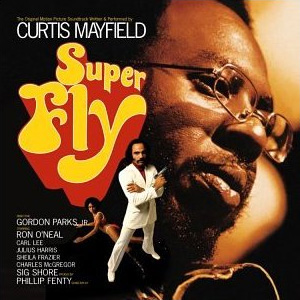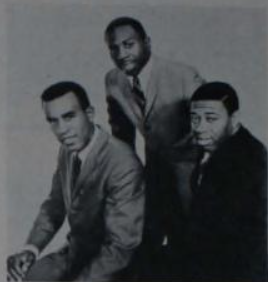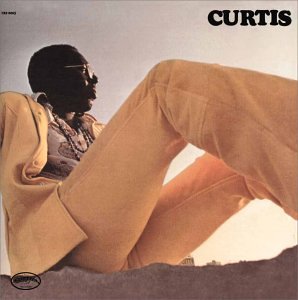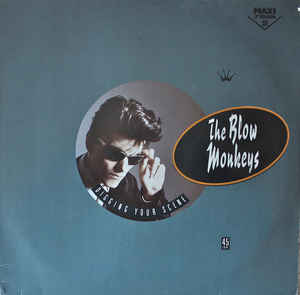
Curtis Lee Mayfield was an American singer-songwriter, guitarist, and record producer, and one of the most influential musicians behind soul and politically conscious African-American music. Dubbed the "Gentle Genius", he first achieved success and recognition with the Rock and Roll Hall of Fame-inducted group the Impressions during the civil rights movement of the late 1950s and the 1960s, and later worked as a solo artist.

Super Fly is the third studio album by American soul musician Curtis Mayfield, released on July 11, 1972 on Curtom Records. It was released as the soundtrack for the Blaxploitation film of the same name. Widely considered a classic of 1970s soul and funk music, Super Fly was a nearly immediate hit. Its sales were bolstered by two million-selling singles, "Freddie's Dead" and the title track. Super Fly is one of the few soundtracks to out-gross the film it accompanied.

The Blow Monkeys are a British pop band formed in 1981. Their first single, "Live Today Love Tomorrow", was released in 1982. They subsequently enjoyed a successful career with several hit singles and albums throughout the 1980s before splitting up at the beginning of the 1990s. Their first hit song was "Digging Your Scene" which hit No. 12 on the UK Singles Chart and No. 14 on the US Billboard Hot 100 chart in August 1986. They had four albums and eleven singles in the UK charts between 1986 and 1990.

The Impressions were an American music group originally formed in 1958. Their repertoire includes gospel, R&B, doo-wop, and soul.

Curtis is the debut studio album by American soul musician Curtis Mayfield, released in September 1970. Produced by Mayfield, it was released on his own label Curtom Records. The musical styles of Curtis moved further away from the pop-soul sounds of Mayfield's previous group The Impressions and featured more of a funk and psychedelic-influenced sound. The album's subject matter incorporates political and social concerns of the time.

Take It to the Streets is an album by the American musician Curtis Mayfield, released in 1990 on Curtom Records. "He's a Fly Guy" first appeared on the soundtrack to I'm Gonna Git You Sucka. The album peaked at No. 59 on Billboard's Top R&B Albums chart.

Major Lance was an American R&B singer. After a number of US hits in the 1960s, including "The Monkey Time" and "Um, Um, Um, Um, Um, Um", he became an iconic figure in Britain in the 1970s among followers of Northern Soul. Although he stopped making records in 1982, Major Lance continued to perform at concerts and on tours until his death in 1994. His daughter, Keisha Lance Bottoms, was the 60th mayor of Atlanta.

Limping for a Generation is the 1984 debut album by the British band The Blow Monkeys.

Animal Magic is the second album from the British band The Blow Monkeys, released in 1986 by RCA/Ariola. It gave the group their commercial breakthrough after their debut album, Limping for a Generation, had won critical acclaim but had only sold modestly.

She Was Only a Grocer's Daughter is the third album by British pop band the Blow Monkeys, originally released in 1987.

Whoops! There Goes the Neighbourhood was The Blow Monkeys' 1989 follow-up album to She Was Only A Grocer's Daughter, released two years before.

Springtime for the World is the fifth album by British band The Blow Monkeys, released in 1990. The work represented the band's ultimate transformation into a dance music act, a direction the band had been gradually moving since their biggest hit single, "It Doesn't Have to Be This Way", and the album it was taken from, She Was Only a Grocer's Daughter.

Choices – The Singles Collection is a compilation album by British band The Blow Monkeys, released in 1989 by RCA and distributed by BMG / Ariola. The album includes most of the band's singles and features genres from the new wave of their debut album to pop rock and funky evolution, up to their discovery of the potentialities of the new dance revolution, a genre that they embraced on their final album, Springtime for the World, which was released the following year, shortly before they split up.

"Freddie's Dead" is a song by Curtis Mayfield. It was the first single from his 1972 soundtrack album for the film Super Fly. The single was released before the Super Fly album, and before the film was in theaters. The song peaked at #4 on the U.S. Billboard Hot 100 and #2 on the R&B chart. Billboard ranked it as the No. 82 song for 1972.

"Superfly" is a song by Curtis Mayfield, the title track from his 1972 soundtrack album for the film of the same name. It was the second single released from the album, following "Freddie's Dead ", and reached #8 on the Billboard Hot 100 and #5 on the Best Selling Soul Singles chart. The lyrics celebrate the craftiness and determination of the film's main character. The song plays over the film's closing credits.

Digging Your Scene: The Best of The Blow Monkeys is a double greatest hits album, released on 4 February 2008 by British band The Blow Monkeys. Led by singer, guitarist, piano and keyboard player Dr. Robert, the group formed in the early 1980s and disbanded in 1990. After that, Dr. Robert went on to pursue a solo career. The Blow Monkeys recently reformed, with the aim of touring and releasing a brand new album.
Sylvia Tella is a British lovers rock singer, who after working as a backing band vocalist for Boney M embarked on a successful solo career, releasing her first album in 1981. She had a top 40 hit in 1989 in collaboration with the Blow Monkeys and again in 1990/1991 with Pop Will Eat Itself.
Julian Mendelsohn is an Australian record producer, audio engineer and mixer.
Peter Wilson is a British record producer. Amongst several others, Wilson worked with the Style Council, Sham 69 and the Comsat Angels.

"Digging Your Scene" is a song recorded by English band the Blow Monkeys for their second studio album, Animal Magic (1986). The single was released in February 1986 as the second one from the parent record. It was written by lead singer Dr. Robert, while Howard, Peter Wilson, and Adam Moesley produced it. Musically a pop, soul, and jazz song, "Digging Your Scene" discusses the hatred and disgust that is associated with individuals who have HIV and AIDS. Several media professionals felt the song's subject matter would be the subject of criticism.

















